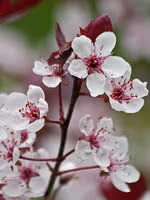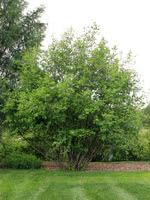Mon-Fri 9am - 5pm Mountain time
Green Alder vs Purple Leaf Sand Cherry
Prunus x cistena
Alnus alnobetula subsp. crispa
CUSTOM GROW
SOLD OUT
Purple Leaf Sand Cherry provides bright reddish-purple leaves that turn bronze-green in the fall. In the spring, tiny flowers with a pinkish white hue bloom. The flowers are small, but the impact comes from the shrub blossoming all at once.
The Purple leaf sand cherry can be susceptible to pests and diseases in more humid areas; a typical life span is approximately 15 years. Not suitable for a privacy hedge on its own but is often alternated with lilacs. Often used as an accent plant that attracts birds and bees.
Green Alder is a native, cold-hardy shrub found in boreal forests, along slopes, and in open upland habitats. It fixes nitrogen in the soil, improving fertility and helping other plants grow, while its roots help stabilize slopes and disturbed ground. Fast to establish on poor soils, it is widely used in reclamation, restoration, and erosion control projects.
With its smooth grey bark and shiny green leaves, Green Alder often forms dense thickets that provide cover for birds and small mammals. Its seeds, buds, and catkins also supply food for wildlife. Green Alder is well suited for naturalization and ecological restoration.
Note: We use Green Alder for Alnus alnobetula subsp. crispa. This species is also known by many other common names, including Mountain Alder, Sitka Alder, and others. Please confirm the scientific name to ensure you are ordering the correct plant.
Purple Leaf Sand Cherry Quick Facts
Green Alder Quick Facts
Toxicity: the leaves and seed are slightly toxic
In row spacing: 0.9 m (3 ft)

